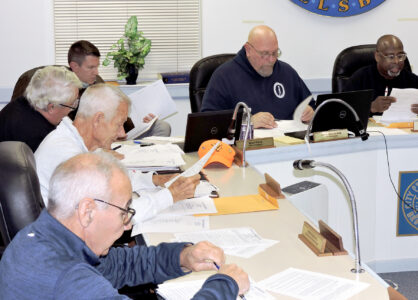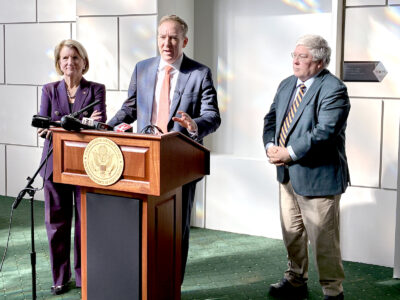EPA Administrator Zeldin joins Sen. Capito for roundtable discussion, tour of energy and manufacturing in W.Va.

PROMOTING THE STATE — EPA Administrator Lee Zeldin, center, takes questions Wednesday at a press conference at the Robert C. Byrd Courthouse in downtown Charleston. He was joined by U.S. Sen. Shelley Moore Capito, left, and Gov. Patrick Morrisey, right. -- Steven Allen Adams
CHARLESTON — The federal government might have been shut down the last several weeks, but U.S. Environmental Protection Agency Administrator Lee Zeldin received a crash course on West Virginia coal and manufacturing sectors with U.S. Sen. Shelley Moore Capito.
Zeldin and Capito were in Charleston Wednesday morning for a roundtable discussion at the Robert C. Byrd Courthouse with Gov. Patrick Morrisey, legislative leaders, the West Virginia Chamber of Commerce, and representatives of the coal, natural gas, and manufacturing industries in the state.
Later Wednesday, Zeldin and Capito visited Appalachian Power’s John E. Amos Power Plant near Winfield, Toyota Motor Manufacturing West Virginia near Buffalo, and the ongoing construction at Nucor Steel West Virginia’s $4 billion sheet steel mill near Apple Grove.
“It’s great to be here in West Virginia,” Zeldin said during a press conference following Wednesday morning’s roundtable. “The EPA’s core mission is protecting Human Health in the environment. It’s a mission that we take to heart. The first pillar of powering the great American comeback is clean air, land and water for all Americans.
“I am very grateful to Senator Capito for reminding me early and often about how important it is for us to strike the right balance in choosing to both protect the environment and grow the economy,” Zeldin continued. “It’s not a choice between the two. We’re excited about doing both.”
Zeldin was one of President Donald Trump’s first nominees, being sworn in as the 17th administrator of the EPA on Jan. 29 following the U.S. Senate’s confirmation of his appointment. Capito, as chairwoman of the Senate Environment and Public Works Committee, shepherded his nomination process.
“He’s traveling…all 50 states, and we’re number 49,” said Capito, R-W.Va. “In a 10-month period of time, he’s been on the go to hear the voices of all kinds of folks and how the EPA and the policies of the EPA impact businesses and individuals.”
Trump, Zeldin and the EPA have been working on easing restrictions on coal-fired powers, announcing in June it would repeal all greenhouse gas emissions standards for the power sector under Section 111 of the Clean Air Act (CAA) and repeal amendments to the 2024 Mercury and Air Toxics Standards (MATS) which also target coal-fired power plants.
During the administration of former president Joe Biden, the EPA released new regulations last year that would have required coal-fired power plants to reduce their greenhouse gas emissions by 90% by 2039, moving up a previous requirement by one year. Plants could also utilize underground carbon capture and sequestration to meet the 90% requirement.
The new regulations included stricter limits on mercury emissions, the amount of seepage of coal ash into local waterways, and the amount of wastewater discharge from plants. According to the EPA’s own estimates, repealing these regulations could save the electricity industry as much as $19 billion in regulatory costs over a two-decade period beginning next year, while repealing the 2024 MATS Amendments could save as much as $1.2 billion in regulatory costs over a decade.
“Our predecessor, the Biden EPA, they were treating it as a binary choice: you could protect the environment or grow the economy,” Zeldin said. “In order to protect the environment, you would have to strangulate the energy economy in West Virginia. We don’t believe that, the Trump EPA. We oppose that approach.”
“We know that President Trump and Administrator Zeldin know that we need every single power source that we can in elongating not just our power plants, but also being able to create new power plants (that) is going to be essential,” Capito said.
As the former three-term attorney general for West Virginia, Morrisey took on the EPA during the second term of former president Barack Obama and Biden’s first and only term, winning victories in the U.S. Supreme Court against the EPA in 2016 and 2022 over the Obama-era Clean Power Plan and in defense of the Trump-era Affordable Clean Energy Rule.
“Mr. Administrator, I’m so grateful for all the hard work you’re putting in and, quite frankly, for the incredible alignment between the Trump administration and West Virginia,” Morrisey said Wednesday. “There’s a unique opportunity available for our state now to really grow and leverage our energy resources; to be a major part of the American energy dominance movement that President Trump has been talking about.”
In September, the U.S. Department of Energy announced that it would implement a $625 million plan to halt the decommissioning of coal-fired power plants, retrofit and modernize the nation’s existing fleet of coal-fired plants. The plan calls for $350 million to recommission closed coal-fired power plants and retrofit all plants to operate more efficiently and add reliability to the power grid. Another $175 million would be used for coal-fired power plants in rural areas.
Environmental advocates, such as the Sierra Club, have raised concerns about decreasing regulations on coal-fired power plants and keeping such power plants operating, increasing costs in ratepayers and increasing health risks, such as reducing clean air for residents near these plants to adding to the growing number of black lung cases among coal miners.
“For centuries, West Virginia has borne the brunt of coal’s consequences, from asthma attacks to cancer battles and energy costs so high that people cannot afford to provide for daily needs,” said Sierra Club West Virginia Chair Jim Kotcon in a Sept. 29 statement. “Rollbacks for billionaires and polluting coal corporations are no show of loyalty to West Virginians who contend daily with coal’s high cost. Accountability is needed, not handouts that reverse protections for our neighbors, land, and waterways across the state.”
Zeldin said the EPA wants to empower states, such as West Virginia, to take a more hands-on approach to environmental protection.
“When you talk about air quality, when we look at the emissions and impacts locally and regionally, we want to empower states to be in charge of their land, their water, their air, as much as possible, rather than some federal bureaucrat sitting in some office in Washington, D.C., acting like we have all the answers to everything,” Zeldin said.
“What I know is that Governor Morrisey and Senator Capito know their state best, and they know these local communities the best,” Zeldin continued. “We want to provide the technical assistance and the expertise, but to do so maximizing the state being able to lead the way, understanding their people the most.”



